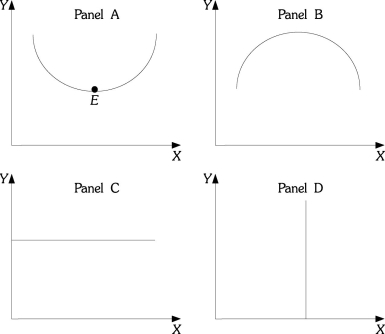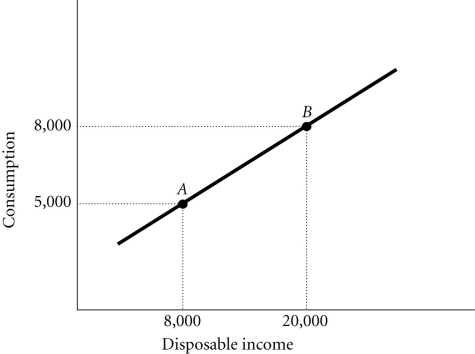A) fallacy of division.
B) fallacy of inductive reasoning.
C) post hoc, ergo propter hoc fallacy.
D) Ockham's fallacy.
Correct Answer

verified
Correct Answer
verified
Multiple Choice
Positive economics is an approach to economics that
A) seeks to understand behavior and the operation of systems while making judgments about their usefulness to society.
B) analyzes outcomes of economic behavior, evaluates them as good or bad, and may prescribe preferred courses of action.
C) seeks to understand behavior and the operation of systems without making judgments.
D) examines the role of government in the economy.
Correct Answer

verified
Correct Answer
verified
Multiple Choice
Refer to the information provided in Figure 1.4 below to answer the question(s) that follow.  Figure 1.4
-Refer to Figure 1.4. Which of the Panels shows a curve or line that has an infinite slope throughout?
Figure 1.4
-Refer to Figure 1.4. Which of the Panels shows a curve or line that has an infinite slope throughout?
A) A
B) B
C) C
D) D
Correct Answer

verified
Correct Answer
verified
Multiple Choice
The branch of economics that examines the functioning of individual industries and the behavior of individual decision-making units is
A) positive economics.
B) normative economics.
C) macroeconomics.
D) microeconomics.
Correct Answer

verified
Correct Answer
verified
True/False
A basic understanding of economics is needed to be an informed citizen.
Correct Answer

verified
Correct Answer
verified
Multiple Choice
The Latin phrase ceteris paribus means that when a relationship between two variables is being studied
A) both are treated as unpredictable.
B) neither of those two variables is allowed to change.
C) all other variables are held fixed.
D) we recognize that some factors are unknown.
Correct Answer

verified
Correct Answer
verified
True/False
The aggregate price level is a topic of macroeconomics.
Correct Answer

verified
Correct Answer
verified
Multiple Choice
If you own a building and you decide to use that building to open a book store,
A) there is no opportunity cost of using this building for a book store because you own it.
B) there is an opportunity cost of using this building for a book store because it could have been used in other ways.
C) the opportunity costs equal the cost of inventory.
D) the only cost relevant to this decision is the price you paid for the building.
Correct Answer

verified
Correct Answer
verified
Multiple Choice
Refer to the information provided in Figure 1.4 below to answer the question(s) that follow.  Figure 1.4
-Refer to Figure 1.4. Which of the Panels shows a curve or line that has a zero slope throughout?
Figure 1.4
-Refer to Figure 1.4. Which of the Panels shows a curve or line that has a zero slope throughout?
A) A
B) B
C) C
D) D
Correct Answer

verified
Correct Answer
verified
True/False
The value of the best alternative foregone is the opportunity cost of making a decision.
Correct Answer

verified
Correct Answer
verified
Multiple Choice
Refer to the information provided in Figure 1.6 below to answer the question(s) that follow.  Figure 1.6
-Refer to Figure 1.6. The slope of the line between Points A and B is
Figure 1.6
-Refer to Figure 1.6. The slope of the line between Points A and B is
A) 0.25.
B) 4.
C) -0.25.
D) -4.
Correct Answer

verified
Correct Answer
verified
True/False
Stability implies a steady rate of economic growth with full employment of resources.
Correct Answer

verified
Correct Answer
verified
Multiple Choice
Refer to the information provided in Figure 1.4 below to answer the question(s) that follow.  Figure 1.4
-Refer to Figure 1.4. At Point E in Panel A, the slope is
Figure 1.4
-Refer to Figure 1.4. At Point E in Panel A, the slope is
A) zero.
B) infinite.
C) negative.
D) indeterminate from this information.
Correct Answer

verified
Correct Answer
verified
Multiple Choice
Refer to the information provided in Figure 1.4 below to answer the question(s) that follow.  Figure 1.4
-Refer to Figure 1.4. Panel C shows a curve which has a slope that is
Figure 1.4
-Refer to Figure 1.4. Panel C shows a curve which has a slope that is
A) first positive and then negative.
B) first negative and then positive.
C) infinite throughout.
D) zero throughout.
Correct Answer

verified
Correct Answer
verified
Multiple Choice
The concept of equity would explain the redistribution from the rich to the poor which is achieved from a tax system that requires taxes to
A) fall when income rises.
B) rise when income rises.
C) remain stable when income rises.
D) be unrelated to income.
Correct Answer

verified
Correct Answer
verified
Multiple Choice
Which of the following is not one of the three fundamental concepts of economics?
A) profit maximization
B) marginalism
C) opportunity cost
D) the working of efficient markets
Correct Answer

verified
Correct Answer
verified
Multiple Choice
If you own a condo and you decide to lease it to your cousin,
A) there is no opportunity cost of leasing the condo because you own it.
B) there is an opportunity cost of leasing the condo because you could have chosen to live in it.
C) there is no opportunity cost of leasing the condo because you collect rent from your cousin.
D) the only cost relevant to this decision is the price you paid for the condo.
Correct Answer

verified
Correct Answer
verified
Multiple Choice
Normative economics ________ and positive economics ________.
A) involves judgments; does not involve judgments
B) involves judgments; also involves judgments
C) does not involve judgments; involves judgments
D) does not involve judgments; also does not involve judgments
Correct Answer

verified
Correct Answer
verified
Multiple Choice
Refer to Scenario 1.1 below to answer the question(s) that follow. SCENARIO 1.1: An economist wants to understand the relationship between minimum wages and the level of teenage unemployment. The economist collects data on the values of the minimum wage and the levels of teenage unemployment over time. The economist concludes that a 1% increase in minimum wage causes a 0.2% increase in teenage unemployment. From this information he concludes that the minimum wage is harmful to teenagers and should be reduced or eliminated to increase employment among teenagers. -Refer to Scenario 1.1. The collection and use of the data on minimum wage and teenage unemployment over time is an example of
A) law and economics.
B) economic history.
C) econometrics.
D) empirical economics.
Correct Answer

verified
Correct Answer
verified
Multiple Choice
Related to the Economics in Practice on p. 6: According to the Economics in Practice, ________ of the $10 retail value of a Barbie doll is captured in the United States.
A) none
B) 35 cents
C) $2
D) $8
Correct Answer

verified
Correct Answer
verified
Showing 141 - 160 of 241
Related Exams